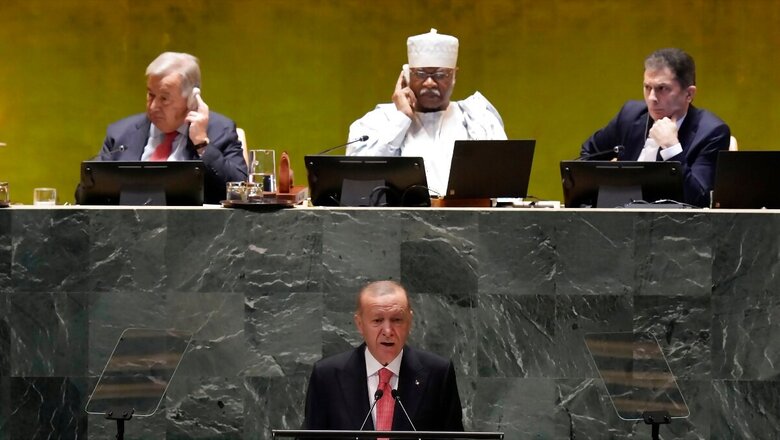
views
In his address at the 79th United Nations General Assembly in New York last month, Turkish President Recep Tayyip Erdogan made a notable omission. For the past five years, following the Indian government’s abrogation of Article 370, Erdogan had consistently voiced opposition to this decision alongside Pakistan during his appearances at the UNGA. This stance aligned with Turkey’s efforts to reposition itself as a leading voice within the Muslim world. However, this recent omission suggests a shift towards more pragmatic geopolitical considerations rather than mere ideological posturing.
In his September 2019 address at the UNGA, President Erdogan referred to Kashmir as a ‘dispute’, asserting that it “must be resolved through dialogue on the basis of justice and fairness, rather than conflict”. The following year, he called for the resolution of “the Kashmir problem” within the framework of UN resolutions, reflecting the aspirations of the Kashmiri people. In 2021, he again emphasized the UN resolutions as the appropriate method for addressing the Kashmir issue. However, in the last two years, specifically 2022 and 2023, while he continued to describe Kashmir as a dispute between India and Pakistan, Erdogan omitted any reference to the UN resolutions as a means of resolution.
This shift may indicate a softening of his stance, as he began to acknowledge the geopolitical complexities of adopting a confrontational position towards India. This year, he surprised observers by entirely excluding any mention of Kashmir, despite discussing atrocities in Gaza and Syria. This omission likely stems from Turkey’s ambition to become a full member of the BRICS bloc, rather than remaining an observer.
In his UNGA address, President Erdogan officially expressed his desire for Turkey to join BRICS, stating, “We maintain our will to develop our relations with BRICS, which brings together emerging economies.” He also highlighted Turkey’s increased engagement with various regional organisations, including the Indian Ocean Rim Association, ASEAN, and the Pacific Islands Forum. Turkey has submitted an official application for BRICS membership to Russia, the current chair of the bloc. Russian President Vladimir Putin has indicated his anticipation of Erdogan’s participation at the upcoming BRICS summit, scheduled for October 22 to 24 in Kazan, Russia. While Russia appears to endorse Turkey’s bid for BRICS membership, consensus will be necessary, with India’s perspective being particularly significant.
Turkey’s pursuit of BRICS membership is driven by several factors. Firstly, the country has heavily depended on the European market for decades and has been attempting to secure EU membership for many years, yet progress has stalled with little promise of advancement in the near future. In this context, diversifying its markets has become crucial for Turkey.
The BRICS bloc encompasses significant emerging economies such as India, China, and Brazil, providing Turkey with potential access to advantageous markets. Moreover, the Turkish economy is currently in a precarious state, grappling with soaring inflation rates and a rapidly depreciating lira. To address these economic challenges, Turkey must recalibrate its foreign policy to align with its economic interests.
The BRIC group was formed in 2006, originally consisting of Brazil, Russia, India, and China, and later expanded to include South Africa in 2010, thus becoming BRICS. Since then, countries such as Egypt, Ethiopia, Iran, Saudi Arabia, and the UAE have joined the bloc. If Turkey achieves full membership in BRICS, it would be the first NATO member to do so, amid existing tensions within NATO due to Turkey’s growing ties with Russia and other non-Western powers.
In this emerging multipolar world, President Erdogan appears to be weighing the risks associated with over-reliance on the EU and NATO for economic and strategic needs. BRICS is positioned as a credible alternative to Western hegemony in global finance, and Turkey is keen to partake in this dynamic. This membership would not only strengthen Turkey’s image as a bridge between East and West but also enhance its status as a significant geopolitical player capable of leading the Muslim world.
Turkey has expressed a desire to join the Shanghai Cooperation Organization (SCO) as a full member, which again hinges on securing India’s support. In recent years, Turkey has significantly enhanced its engagement with Pakistan across military, cultural, and diplomatic spheres, yet it appears to be moderating its provocative stance towards India. This shift towards rapprochement is particularly important for Turkey during these challenging economic times. It remains to be seen how this realignment will affect Turkey’s aspirations to enter BRICS and SCO, as well as its future relations with India.
The writer is an author and columnist and has written several books. His X handle is @ArunAnandLive. Views expressed in the above piece are personal and solely those of the author. They do not necessarily reflect News18’s views.













Comments
0 comment